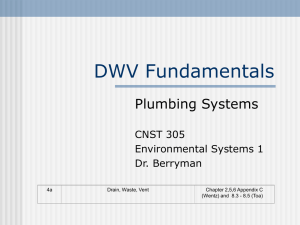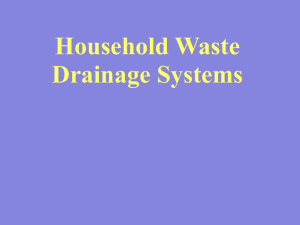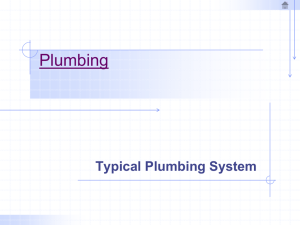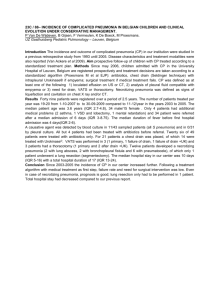Quiz 1WARNING - AnytimeCE.com
advertisement
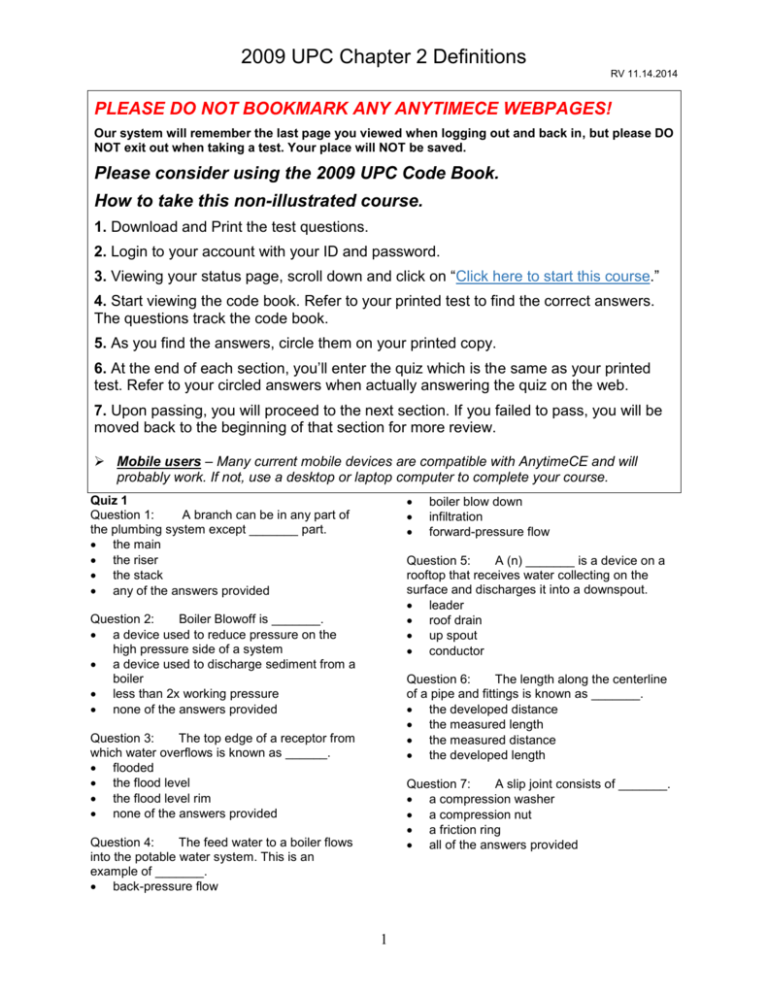
2009 UPC Chapter 2 Definitions RV 11.14.2014 PLEASE DO NOT BOOKMARK ANY ANYTIMECE WEBPAGES! Our system will remember the last page you viewed when logging out and back in, but please DO NOT exit out when taking a test. Your place will NOT be saved. Please consider using the 2009 UPC Code Book. How to take this non-illustrated course. 1. Download and Print the test questions. 2. Login to your account with your ID and password. 3. Viewing your status page, scroll down and click on “Click here to start this course.” 4. Start viewing the code book. Refer to your printed test to find the correct answers. The questions track the code book. 5. As you find the answers, circle them on your printed copy. 6. At the end of each section, you’ll enter the quiz which is the same as your printed test. Refer to your circled answers when actually answering the quiz on the web. 7. Upon passing, you will proceed to the next section. If you failed to pass, you will be moved back to the beginning of that section for more review. Mobile users – Many current mobile devices are compatible with AnytimeCE and will probably work. If not, use a desktop or laptop computer to complete your course. Quiz 1 Question 1: A branch can be in any part of the plumbing system except _______ part. the main the riser the stack any of the answers provided boiler blow down infiltration forward-pressure flow Question 5: A (n) _______ is a device on a rooftop that receives water collecting on the surface and discharges it into a downspout. leader roof drain up spout conductor Question 2: Boiler Blowoff is _______. a device used to reduce pressure on the high pressure side of a system a device used to discharge sediment from a boiler less than 2x working pressure none of the answers provided Question 6: The length along the centerline of a pipe and fittings is known as _______. the developed distance the measured length the measured distance the developed length Question 3: The top edge of a receptor from which water overflows is known as ______. flooded the flood level the flood level rim none of the answers provided Question 7: A slip joint consists of _______. a compression washer a compression nut a friction ring all of the answers provided Question 4: The feed water to a boiler flows into the potable water system. This is an example of _______. back-pressure flow 1 2009 UPC Chapter 2 Definitions RV 11.14.2014 Question 8: The _______ is a device that equalizes hot and cold water flow to prevent temperature fluctuations. metering valve tub shower valve temperature pressure relief valve pressure balancing valve Question 14: An excess flow valve (EFV) is _______. a valve designed to open when the fuel gas exceeds a prescribed flow rate a valve designed to activate when the fuel gas passing through exceeds a prescribed flow rate a valve designed to close when the fuel gas passing through drops below a prescribed flow rate a valve designed to open when the fuel gas passing through drops below a prescribed flow rate Question 9: A (n) _______ is a device that is installed in a sanitary drainage system to intercept non-petroleum fats, oils and grease from a wastewater discharge. Grease Interceptor NPF Disposal System Effluent Separation Interceptor FOG Disposal System Question 15: “Shall” means _______. required recommended optional any of the answers provided Question 10: A _______ is the waste system that has rigid threaded DWV piping with recessed fittings. Durham system primitive plumbing system cast iron system galvanized system Question 16: Clear water waste is _______. waste cooling water condensate from refrigeration systems condensate from air conditioning systems condensate from steam heating systems any of the answers provided Question 11: A _______ is a pipe connection from a waste stack to a vent stack for the purpose of preventing pressure changes in the stacks. yoke vent vent crossover safety measure Durham system Question 17: PEX is the abbreviation for _______. Cross-Linked Polyethylene Permanent Expanded Xylene Professional Exam Cross Check Plumbing Exam none of the answers provided Question 12: A “remote outlet” refers to _______. the point where the water can be drained from the water system to prevent freezing the furthest fixture the furthest point water is from the meter base the most remote accessible cleanout Question 18: Acrylonitrile-butadiene-styrene is _______. a type of material used to create conduits for conveying building drains a special caulking for ceramic tile a toxic material that is banned for potable water systems a chemical that is a controlled substance also known as ABS in the trade Question 13: An effective opening is _______. the minimum cross-sectional area at the point of water supply discharge measured in terms of a circle the minimum cross-sectional area at the point of water supply discharge measured in terms of a circular equivalent to the crosssectional area either of the answers provided neither of the answers provided Question 19: A device that treats water by filtering out suspended solids is known as _______. a. a water-conditioning device b. a water-treating device c. both a and b d. neither a or b 2 2009 UPC Chapter 2 Definitions RV 11.14.2014 Question 20: An area drain is a receptor designed to collect surface or storm water from an open area. True False Question 2: A control valve is installed in a new installation and must be accessible. “Accessible” means that it can be _______. accessed directly without any obstructions accessed by cutting an opening into the wall accessed by removing a fixture or appliance accessed by removing an access door none of the answers provided Question 21: A person that engages in general plumbing service work is, according to the UPC, considered to be _______. a journeyman plumber the owner of a plumbing business plumbing a plumbing contractor Question 3: A backwater valve is installed in a water supply system to prevent reverse flow. True False Question 22: A water hammer arrester is a device designed to provide protection against hydraulic shock in the building water supply system. True False Question 4: A gravity grease interceptor does not have the following features: 30-minute retention time baffle(s) a minimum of three (3) compartments a minimum total volume of not less than 300 gallons Question 23: A cesspool _______. holds organic solids is a lined excavation permits liquids to seep through the bottom and sides any of the answers provided none of the answers provided Question 5: Which item is NOT a plumbing fixture? a clinic sink an industrial safety shower a kitchen sink industrial tanks or vats Question 24: A shielded coupling is an approved elastomeric sealing gasket with an approved outer shield and a tightening mechanism. True False Question 6: A trap seal is the _______ distance between the crown weir and the top dip of the trap. horizontal vertical average maximum minimum Question 25: A Grease Removal Device (GRD) that automatically, mechanically removes non-petroleum fats, oils and grease (FOG) from the interceptor, is a device. True False Question 7: Hot water is defined as water greater than or equal to _______. 100 °F 120 °F 130 °F 140 °F Quiz 2 Question 1: The bathroom in a restaurant has a locking door to permit only one person to use the single water closet in the facilities. This bathroom is considered to be _______. a. public b. private c. private use d. both b and c Question 8: Any and all liquid or waterborne waste from industrial or commercial processes, except domestic sewage, is referred to as _______. sewage waste industrial waste commercial waste 3 2009 UPC Chapter 2 Definitions RV 11.14.2014 Question 9: A connection with a potable water system that could cause the system to be unsafe is known as a _______. cross-condition cross-connection effective opening critical connection Question 16: The potable water system that is buried in public streets is known as a _______. a. street main b. water main c. public main d. both a and b Question 10: A water closet installed so that it does not touch the floor is known as _______. side-wall hung back-hung well-hung wall-hung Question 17: How many definitions are found under the letter O in the UPC? 0 1 2 3 Question 11: The building supply pipe, the water-distributing pipes and all fittings and appurtenances are known as _______. a potable water system a water supply system a water distributing pipe a structure water system Question 18: A device that prevents liquid from flowing back into the potable system is known as _______. a backflow preventer a double check valve assembly an anti-flow meter none of the answers provided Question 12: “Approved” means acceptable to _______. the general contractor the home owner AHJ the bank Question 19: A vent that also serves as a drain is known as a _______. dirty arm vent wet arm vent combination waste and vent wet vent Question 13: "Flammable fumes" is the term for concentration of flammable constituents in the air that exceeds _______ of its lower flammability limit. 25% 50% 75% 100% Question 20: The unobstructed vertical distance through the atmosphere between the lowest opening from a potable water faucet to the flood rim of a fixture is known as _______. a water distribution airgap a drainage airgap an airbreak indirect waste none of the answers provided Question 14: _______ pressure is the pressure existing without any flow. Residual Calibrated Direct Static Question 21: A Hydro-mechanical Grease Interceptor incorporates which of the following except? External flow control, with air intake (vent): directly connected External flow control, with air intake (vent): indirectly connected External flow control, without air intake (vent): directly connected Without external flow control: directly connected Without external flow control: indirectly connected Question 15: A lined excavation in the ground which receives the discharge of a septic tank is known as a _______. sand filter sand interceptor seepage pit remote septic field 4 2009 UPC Chapter 2 Definitions RV 11.14.2014 Question 22: A pipe that moves waste or fecal matter is called a _______. waste pipe drain line sewer line none of the answers provided Question 3: Material or equipment that has the mark of an approved listing agency is considered to be _______. approved listed registered labeled Question 23: On a remodel, older plumbing work is uncovered that does not meet the latest current code. This work is considered to be _______. accepted approved existing work a mess any of the answers provided Question 4: To be called a riser, a vertical water line must extend at least _______. 12 inches 36 inches one full story or more no limit, there is no height requirement Question 5: Two showers that are installed in the same custom bathroom are known as a _______. a. customized shower b. gang shower c. group shower d. both b and c Question 24: A drain that dumps into a drainage system, but does not make a physical connection with the drain, and that has a physical gap between itself and the drainage system is known as _______. an airgap an airbreak an indirect waste pipe a direct waste pipe Question 6: The vertical DWV main of a system extending through one or more stores is referred to as a _______. soil stack VTR stack stack DWV stack Question 25: Any pipe that is installed at an angle less than 45 degrees from vertical is considered _______. crooked vertical horizontal bent Question 7: A person who is competent to test backflow assemblies to the satisfaction of the AHJ is known as a _______. plumber journeyman plumber certified backflow assembly tester none of the answers provided Quiz 3 Question 1: A legally recorded individual area of land that is built or being built, that is regulated by this code, and that is in possession of the owner, is called a _______. lot plot short plot property headache Question 8: The pipe that supplies potable water from the water meter to a building or another point of use is known as a (n) _______. a. building supply b. irrigation line c. water service d. both a and c Question 2: A vent connecting one or more individual vents with a vent stack is known as a _______. combination vent connecting vent T vent branch vent Question 9: That portion of a fixture drain between the trap and the vent is called a _______. wet vent dirty arm trap arm drain line 5 2009 UPC Chapter 2 Definitions RV 11.14.2014 Question 17: The word “should” in the plumbing code means _______. recommended required mandatory none of the answers provided Question 10: An installation that could allow waste to flow into the potable system is called _______. a backflow connection back-siphonage a backflow condition none of the answers provided Question 11: Any pipe that is installed at an angle greater than 45 degrees from horizontal is considered to be a _______ pipe. crooked vertical horizontal bent Question 18: Regulating equipment is (are) _______. a valve in the plumbing system a control in the plumbing system parts of the plumbing system that are required to be accessible or readily accessible all of the answers provided Question 12: The building drain must extend _______ from the outside of the building wall to the building sewer. 2 feet 4 feet 6 feet 8 feet Question 19: The _______ moves the potable water from the building supply pipe to the plumbing fixtures. water distributing pipe structure water system potable water system none of the answers provided Question 13: Fittings that are used to bring pipes together to make a slight directional change are known as _______. offsets insets resets non-sets Question 20: The part of the horizontal piping of a drainage system that extends from the end of the building drain, and that receives the discharge of the building drain, and that conveys it to another point of disposal is known as the _______. building sewer street connection disposal sewer line waste and gray water line Question 14: Supports are also known as _______. a. hangers b. anchors c. members d. both a and b Question 21: A sewer system from a new housing development is to be connected into a public system in the street. This system is classified as a _______. certified private disposal system public sewer private sewer standard disposal system Question 15: The exterior vertical drainage pipe for conveying storm water from roof or gutter drains is called a _______. rain drain riser leader conductor gutter drain Question 22: A building drain (sanitary) conveys sewage only. True False Question 16: PVDF stands for _______. Polyvinyl Difluoride Polyvinylidene Fluoride Polyvinyl Dissipated Fluorine Polyacrylic Vinynidene Fluoride 6 2009 UPC Chapter 2 Definitions RV 11.14.2014 Question 23: An individual vent is _______. a pipe that terminates in the open air a pipe that connects to a vent system above the fixture it serves a pipe that vents a fixture all of the answers provided none of the answers provided Question 4: A drain that does not flow by gravity into the building sewer is referred to as _______. a building subdrain a supplementary building drain a building storm sewer an illegal drain—all must tie into city sewer Question 24: A fuel-burning appliance is located in a confined space. The space must have at least _______ cubic feet per 1000 BTUH. 1 50 75 100 200 Question 5: The pressure available at the fixture outlet, after all other losses in the system during maximum demand periods, is called _______ pressure. gauge static street main line residual Question 25: A _______ is that part of a plumbing system that is installed to serve more than one fixture. combination gang multiple common none of the answers provided Question 6: SDR means _______. standard dimensional ratio statistical dimensional rating standard diameter resource sewer discharge rate Question 7: CPVC is _______. Cold Pressurized Valve Connection Conductor Pressure Value Coefficient Chlorinated Polyvinyl Chloride Calculated Pressure Valve Capacity Quiz 4 Question 1: The principal artery of any system of continuous piping to which branches may be connected is called _______. an arterial line the principal line the main line any of the answers provided Question 8: A drain line that catches subsurface and/or seepage water is known as a ___________. subsurface drain below grade drain storm drain subsoil drain Question 2: A device that separates hazardous wastes from normal wastes and permits normal wastes to discharge into the disposal terminal by gravity is called a (n) _______. a. retention tank b. clarifier c. interceptor d. both b and c Question 9: A bathroom group must include __________. a water closet a water closet and a sink a water closet, a sink and a bathtub or shower a bathtub or shower Question 10: A storm sewer conveys all of the following except ______. fecal material rainwater condensate surface water cooling water Question 3: Potable water _______. flows into pots, pans, bottles and containers is for potted plants is used to irrigate “pot” plants and other controlled substances any of the answers provided none of the answers provided 7 2009 UPC Chapter 2 Definitions RV 11.14.2014 Question 11: Vent pipes ________. provide a way for sewer gas to vent to the atmosphere stop back-siphonage of traps relieve pressure in the drainage system all of the answers provided Question 18: A plumbing system has been installed except for setting up/hooking up the fixtures. At this point the installation is labeled a _____. system install roughing-in rough-out partial install Question 12: The water line between the angle stop and the water closet is called the __________. fixture supply toilet tank supply line fixture branch flexible water supply line Question 19: __________ is the term used when potable water that contains bacteria creates a public health hazard. a. Contamination b. High hazard c. Non-drinkable d. Non-sanitary e. both a and b Question 13: A building storm sewer may convey sewage. True False Question 20: The purpose of a (n) _____ is to provide circulation of air between the drainage and venting systems. relief vent secondary vent supplementary vent add-on vent Question 14: A maximum of _____ lavatories in sets can be serviced by a single trap. one two three four Question 21: A (n) _______ is between the water line to a kitchen sink and the main water line. water line auxiliary line branch supply line arterial line fixture branch Question 15: An installation that is required to be readily accessible means that it can be __________. accessed by cutting into a wall accessed by removing an access panel, door or another accepted method accessed by removing a fixture or appliance none of the answers provided Question 16: A cross-connection can result in non-potable water entering into the system. True False Question 22: Water which is safe to drink is known as _______. potable water tap water certified water drinking water Question 17: Water from a tap is discovered to have a light brown hue and smells bad, but testing reveals that the water is safe to drink. It is classified as ____. a. a nuisance b. a low hazard c. polluted d. unsafe e. both b and c Question 23: An insanitary condition could mean _______. a trap does not maintain a proper trap seal there is a defect in a trap or fitting a cross-connection is installed that could lead to contamination of the potable water system any of the answers provided none of the answers provided 8 2009 UPC Chapter 2 Definitions RV 11.14.2014 Question 5: “Diameter” is usually the nominal diameter as commercially designated. True False Question 24: A macerating toilet system ________. grinds the effluent and pumps it to an approved point of discharge cannot be installed in a private sewer/ disposal system is insanitary was originally designed and installed in Macedonia Question 6: A fitting supplied with water under positive pressure that passes through an integral orifice causing a vacuum, is called __________. a vacuum tap a pressure tap a negative pressure tap an aspirator Question 25: The elevation of the design flood relative to the datum on the community’s designated flood hazard map is known as a (n) ______. design flood elevation flood plain overflow field high water area none of the answers provided Question 7: The flow of water into the distributing pipes of a potable supply of water from any source, other than its intended source, is known as _____. forward flow backflow side flow reversed flow Quiz 5 Question 1: Domestic sewage may contain industrial wastes. True False Question 8: The flowing back of polluted water from a plumbing fixture into the water supply pipe because of pressure lower than atmospheric is known as ____. reversed flow backing-up flow negative flow connection contaminated flow back-siphonage Question 2: The physical separation below the inlet into the indirect waste receptor from the fixture is known as _______. the specified gap an air break a break gap a space break Question 9: A room equipped with a water closet and a lavatory is known as a ______. 1/4 bathroom 1/2 bathroom bathroom any of the answers provided none of the answers provided Question 3: A pressure surge-absorbing device operating through the compressibility of air is known as a water hammer arrester or as a ____________. vibration damper vibration arrester shock absorber shock arrester none of the answers provided Question 10: Any group of two or more similar, adjacent fixtures that discharge into a common horizontal waste or soil branch is called a __________. double bathroom double discharge multiple fixture connection battery of fixtures Question 4: A drain is _____ pipe that carries waterborne wastes in a building drainage system. an ABS a 1-1/2 inch or larger a 3 inch or larger a galvanized or copper any of the answers provided 9 2009 UPC Chapter 2 Definitions RV 11.14.2014 Question 11: The load on a plumbing system from different kinds of fixtures is known as a _____. load fixture unit fixture number load unit none of the answers provided Question 17: Slope also means _____. angle run offset grade any of the answers provided Question 18: Top Dip (of trap) is the _____ point in the internal cross-section of a trap at the lowest part of the bend. lowest highest average Question 12: A ____ tank is located above a water closet for the purpose of flushing the usable portion of the fixture. rinse hose storage water flush Question 19: A sink that receives wastes from bedpans, has a flush rim, an integral trap with a visible trap seal, and is similar to a water closet, is known as a ______. clinic sink bedpan sink nursing home sink hospital sink Question 13: A building drain that conveys only sewage is known as a _______. waste drain black water drain human waste drain building drain sanitary building storm drain Question 20: A system of waste piping embodying the horizontal wet venting of one or more sinks by a common waste and vent pipe, and that is sized for free air movement above the flow line of the drain is a ______. cross-connection system multiple-connection system combination waste and vent system double-connection system Question 14: A building drain that conveys only storm water but no sewage is known as a ________. waste drain black water drain human waste drain sanitary building drain building drain storm Question 21: A pipe inside the building which conveys stormwater from the roof to a storm drain/combined building sewer is known as a (n) _____. conductor insulator interior wall roof drain enclosed drain Question 15: A building sewer that conveys storm water and sewage is known as a (n) ____________. rain drain white water drain unsanitary waste drain storm building drain building sewer-combined Question 22: A room or space having a volume less than 50 cubic feet per 1000 BTUH of the aggregate input rating of all fuel-burning appliances installed in that space, is known as a (n) ______. non-vented room undersized space redefined space confined space Question 16: A tank integrated within an air accumulator vessel that discharges a preset amount of flushing water is known as a __________. hydraulic tank pressure water tank flushometer tank single flush tank metered flush tank 10 2009 UPC Chapter 2 Definitions RV 11.14.2014 Question 23: A vertical vent that is a continuation of the drain to which it connects is known as a (n) ______. non-interrupted vent continuous vent extended vent combination vent none of the answers provided Question 5: A welded joint is joined together by epoxy cement. True False Question 6: A drain from the trap of a fixture to the junction of that drain with any other drainpipe is known as a _____. combination drain continuous drain multiple-use drain fixture drain any of the answers provided Question 24: A drain connecting the compartment of a set of fixtures to a trap is known as a (n) ________ drain. non-interrupted waste continuous waste extended waste combination waste Question 7: When the liquid rises to the flood level rim, the fixture is known as _______. overloaded overflowed flooded capacity excess Question 25: A single-family dwelling can have a maximum of ___ family units. 1 2 3 less than 14 Question 8: A valve located at the bottom of the tank for the purpose of flushing water closets is known as a _____. basin valve tank valve flush valve waste valve Quiz 6 Question 1: A vacuum is any pressure ____ that exerted by the atmosphere. less than more than equal to Question 9: A pipe welder holds a certificate from ASME Boiler and Pressure Vessels Code, Sec. IX. True False Question 2: The rain leader from the roof to the building storm drain located outside of the building is known as a (n) ____. elbow leave port leaf port downspout Question 10: The fall of a line of pipe in reference to a horizontal plane is known as _______. grade drop decline degrees Question 3: A device that prevents excessive vacuum in a pressure vessel is called a (n) ______. anti-vacuum device relief vacuum valve air intake valve atmospheric equalizer valve vacuum relief valve Question 11: A Crown or Trap Weir is the ______ point in the cross-section of the horizontal waterway at the exit of the trap. lowest highest average design Question 4: The term “unsanitary” can be used for “insanitary.” True False 11 2009 UPC Chapter 2 Definitions RV 11.14.2014 Question 12: The lowest portion of the inside of a horizontal pipe is known as the ________. bottom BDC invert convert Question 19: The _____ is a standard that is an extensive compilation of provisions that is adopted into law independently of other standards. Code Guideline Guide Rule none of the answers provided Question 13: A joint obtained by joining 2 metal parts with alloys, which melt at a temperature up to and including 840° F, is known as a __________. sweat joint soldered joint brazed joint welded joint Question 20: A ______ valve discharges a predetermined quantity of water to fixtures for flushing, and is actuated by direct water pressure. rise flood flushometer dump fast-acting sweep Question 14: To be called a Whirlpool, a bathtub must be manufactured by Whirlpool Corp. of Benton Harbor, MI. USA. True False Question 15: Shall Must Required May Question 21: “High-Hazard” is used interchangeably with ________. pollution non-potable fouled contamination none of the answers provided ______ is a “permissive term.” Question 16: A (n) _______ bathtub is equipped and fitted with a circulating piping system designed to accept, circulate, and discharge bathtub water upon each use. GE Lennox A.O. Smith Whirlpool Delta Question 22: FOG is an abbreviation for _____. fats, oils, grease floating on grease flood on grade flush on grade Question 23: Any liquid waste containing animal or vegetable matter in suspension, or that may include liquids containing chemicals in solution, is known as _____. sewage black water white water gray water Question 17: A building is a structure for housing, shelter or support of persons, animals, or property of any kind. True False Question 18: A mixing valve that senses incoming hot and cold water temperatures, and compensates for fluctuations in either to stabilize outlet temperatures, is known as a (n) _____. mixing valve pressure balancing valve combination thermostatic/pressure balancing valve anti-scalding valve Question 24: matter. True False 12 Liquid waste includes fecal 2009 UPC Chapter 2 Definitions RV 11.14.2014 Question 25: A joint obtained by joining 2 metal parts with metallic mixtures or alloys, which melt at a temperature above 840° F, is known as a _________. sweat joint 13 soldered joint brazed joint welded joint
